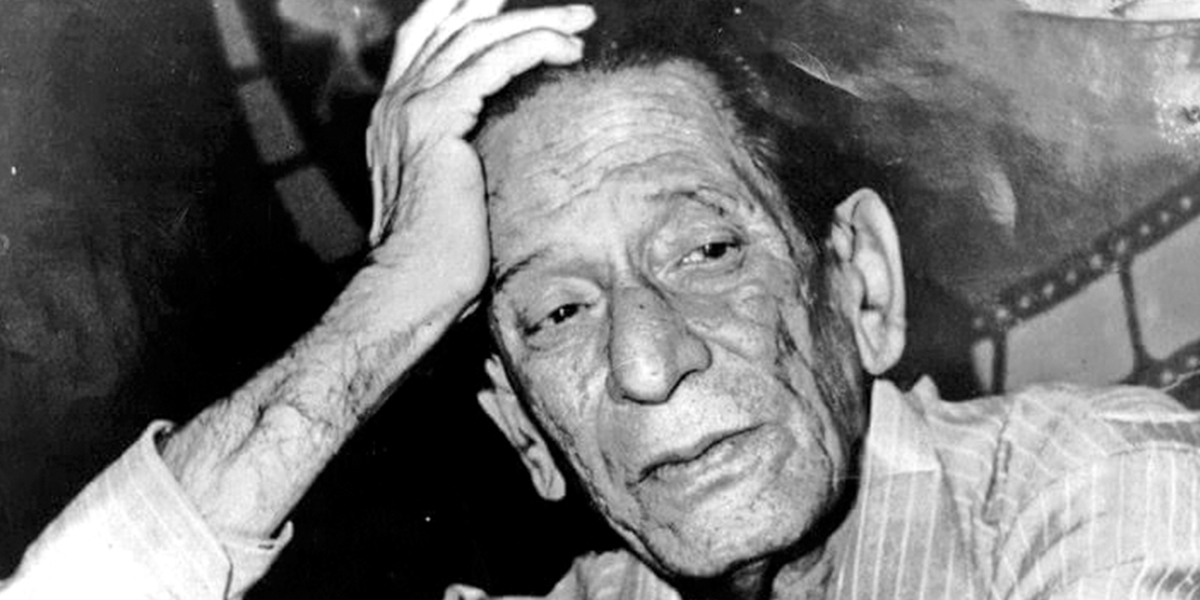Karachi: Khwaja Khurshid Anwar was not only a musician but a jack of all trades. He was a multi-talented genius who had written, directed and produced several stories for the films. Spanning a music career from 1939 to 1984, he was known for making magic using musical instruments in the most innovative manner. He created an ambiance through his notes that only a master artist could conceive. To comprehend the haunting quality of his music and his brilliance in emoting emotions through musical compositions, one has to listen to the melody created in 1962 for film Ghungat, ‘Kabhi tum bhee hum say thay aashna’ where he switches between ayman, bheravi and shankra raags so beautifully that the listener is left spell bound. The timeless soothing melody was filmed on the classic beauty of yesteryears, Nayyar Sultana, and sung by the melody queen, Madam Noor Jehan.
Born on 21st March, 1912, in Mianwali, Khwaja Khurshid Anwar came from a prominent family of Lahore. His maternal grandfather, Khan Bahadur Dr. Sheikh Atta Mohammad was a Civil Surgeon, whose eldest daughter was married to the famous poet Dr. Allama Iqbal. As a child he spent a lot of time with his maternal aunt and uncle, Dr. Iqbal. Khurshid Anwar, His uncle had inherited the love for music from his father, Khwaja Ferozuddin Ahmad, a Barrister who had a huge collection of classical gramophone records.
Khurshid’s family used to host weekly sittings with the best singers and musicians and as a young boy he would absorb the lyrics, music and tones. The fact that he did not hail from a formal music gharana did not deter him from taking a plunge as a music composer and formally becoming a student of Khan Sahib Tawakkal Hussain in 1934 to get professional training in classical music.

Khurshid did not learn any instruments so kept composing all his songs on his vocal training and that is what set him apart from other musicians who generally compose songs on one instrument of their choice. This training of classical vocals and raagdari reflected in his compositions throughout his career. His understanding of the nuances of subcontinent’s classical music always gave his music for films a distinct flavor and are fully on display in his timeless compositions of Koel which was released in 1959. The film went to be an eternal classic and songs such as ‘Rim jhim, rim jhim parray phuwar’, and the ever mesmerizing ‘Dil ka diya jalaya’ in Raag Jaijaivanti.
Not many know that Anwar was a recipient of a gold medal in Philosophy from the Government College Lahore. Pushed by his family, he reluctantly appeared for the civil service exam, and ended up getting first position. Much to his relief he did not pass the interview because of his critical views on British Raj. He, with Faiz Ahmad Faiz, famous poet and his senior in college, had already been to jail for their revolutionary activities. This is when most of his time was spent in the company of other giants of their respective fields such as Faiz, Patras Bukhari, Rafi Peer, Noon Meem Rashid, Sufi Ghulam Tabassum, and Dr. Taseer. Following passion for music, he joined All India Radio Delhi as a producer. There he met Abdul Rasheed Kardar who introduced him to film fraternity of Bombay. In 1941, Anwar’s debut as a music composer was in a Punjabi film Kurmai which was directed by Abdul Rasheed Kardar. Before partition, he gave music in about six films with some outstanding songs. In Parwana, his melodies for singers S. K. Sehgal and Suraiya left a moderate impact.
Another fact that his fans might not know is that Anwar has an honour of composing the signature tune for Radio Pakistan at the time of the birth of Pakistan although he did not move to the new country till 1952. This tune was based on the Al-Azhar style of reciting Quran. This was the first piece of music that was played on Pakistan Radio. Once he shifted back to Lahore, Anwar began exploring film industry where the music scene was dominated by maestros such as Baba Chishti, Master Inayat, and Rashid Attrey. Anwar was significantly different from other music composers as he envisaged a story, its scenes, characters and music all together. His first film in Pakistan, Intezar, which he wrote, produced and composed music for, broke all records. Its songs sung by and picturized on Madam Noor Jehan became immortal.
Use of raga Mian ki Tori for ‘Jis din say piya dil lay gaye’ and ‘Chand hansay, dunya bassay’ from the same movie took the cinema music to new altitudes.
He was not only acing the industry as a musician or singer, but as a writer he gave us stories like Koel which was about a female singer and her love for music. She faces criticism by the society, however, the protagonist keeps her musical integrity despite all odds. This film proved to be the most alluring backdrop for the musical genius of Khurshid. The musical was an instant box office success and its songs are considered the best music compositions to ever grace Pakistani cinema. Every song of the film is still etched in the minds and hearts of lovers of Pakistani film industry’s music tradition such as ‘Sagar roey’ and ‘Terey bina soni soni lagay ray’ and the song that gave Noor Jehan a new avatar, ‘Mehki fazaeen’ make Koel’s soundtrack unparalleled till date.
Some of Khwaja Khurshid Anwar’s other memorable films include Jhoomer, Zahir-e-Ishq, Haveli, Sarhad, and Salam-e-Mohabbat. He made music with equal passion and dexterity for his own productions as well as for others. ‘Mera bichra balam ghar aagya’ in Naseem Begum’s melodious voice is a testimony of the fact that Khurshid was equally comfortable in composing music for any vocalist.
Ghoongat in 1962, Chingari in 1964 and Humraz in 1967 were his signature projects which he wrote, directed, and produced and composed musical scores himself. For Ghoongat, many a times he recorded only the echo of the instruments to create a soulful touch he wanted. The music for this film got him Nigar Award and was sent as an Oscar nomination from Pakistan. In Chingari he used classical ragas to craft his tunes. The song ‘Kali kali mundlaye bhanwara’ of Chingari portrays requited love like very few compositions have ever been able to capture. With a tongue in cheek nag, the reverberations of this composition can actually make one feel the buzzing presence of a beetle around perkily moving from flower to flower. With Humraz he couched his story with 7 hit songs with lyrics by Qateel Shifai picturized on the classic beauty of the times, Madam Shamim Ara.
Khurshid also gave music to films based on centuries’ old folk epics, Shirin Farhad, Mirza Sehban, Mirza Jat and the most popular story of South Asia – Heer Ranjha. Films based on the tale of Heer Ranjha have been made more than ten times between India and Pakistan but after Ijaz Durrani’s production and Khwaja Khurshid Anwar’s music, at least Pakistani filmmakers never attempted a remake as their version has a cult following to this day. There will be few in this part of the subcontinent who will not be familiar with ‘Sun wanjhli di mithri taan’ from the soundtrack for Heer Ranjha composed by Khurshid
Like his contemporaries, Khurshid did not compose music for hundreds of films but only 6 in joint India and 19 in Pakistan and composed about 250 songs in total. He put in an effort in each of his film like a father nurtures a child, making sure it was blended together with good stories and impressive characters – kneaded well with background scores and evergreen melodies. An avid reader, he believed in constant growth as an artist and a person. He was presented Sitara-e-Imtiaz for his invaluable contribution to the film industry.
When Khwaja Khurshid Anwar’s college fellow, Faiz Ahmad Faiz was heading Pakistan National Council of the Arts, he involved him to compile knowledge of classical music in two sets of cassettes: Raag Mala and Gharano ki Gaiki. These remain the most authentic references to understand the evolution of classical music of subcontinent. In addition to his immortal melodies, these scholarly masterpieces are an invaluable gift left behind by Khwaja Khurshid Anwar.
Khurshid passed away on October 30th, 1984 but continues to live on through the unique music that he created. Noor Jehan, the most gifted songstress of subcontinent, once said; ‘The compositions that Khwaja Khurshid Anwar created are unparalleled in both Pakistan and India. I have never come across such an exceptional music genius in my entire life.’ The maestro may have left the room but his magical music continues to play on.



















